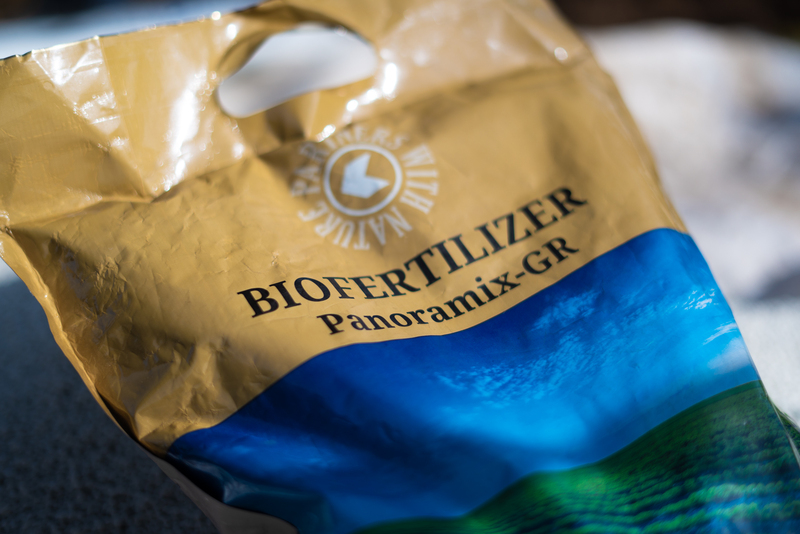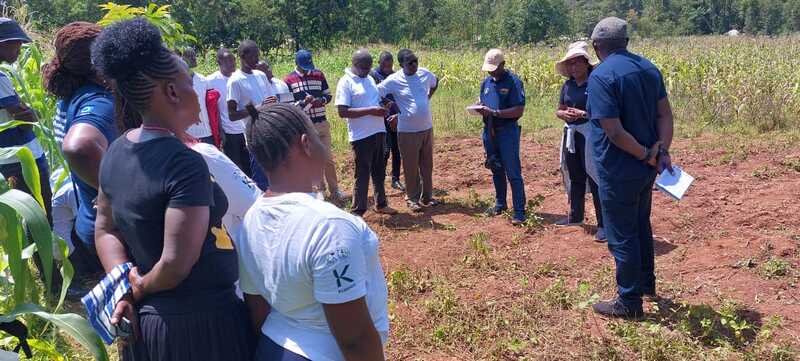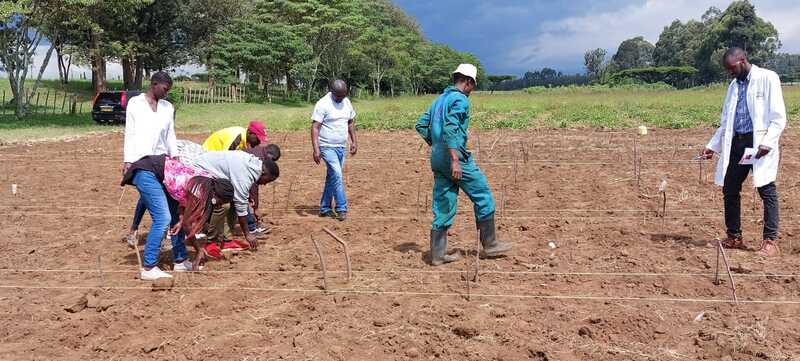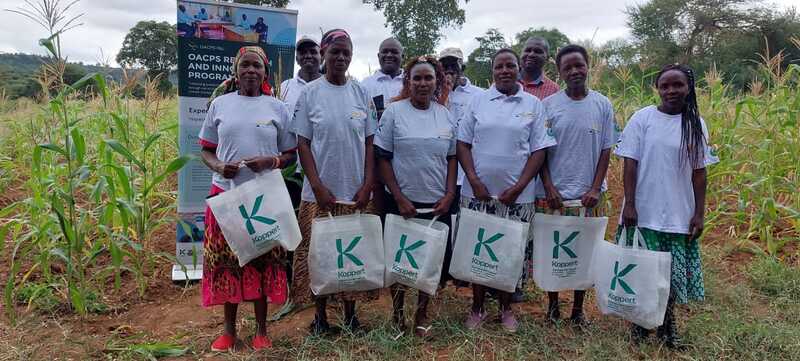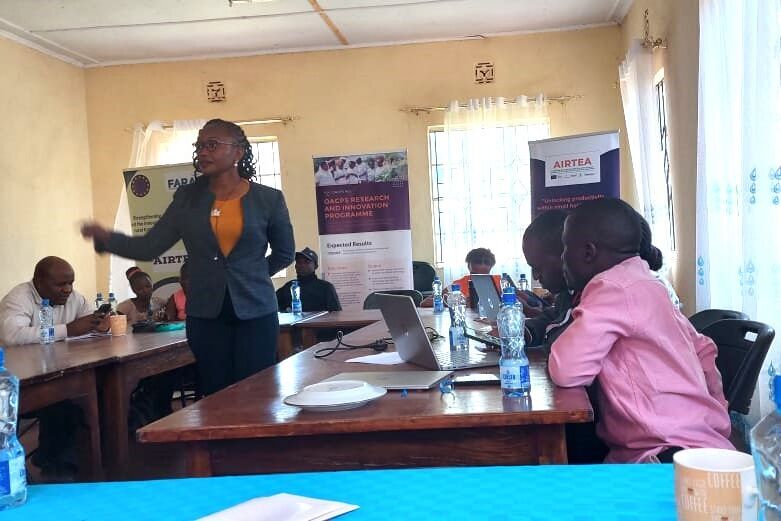
For the past 2 years, Koppert has proudly partnered with the AIRTEA project, fostering a transformative journey that intertwines innovation, resilience, and sustainable agricultural practices. As a key partner in the project, Koppert assumed a vital role, delivering climate-smart agricultural solutions and championing the cause of resilient smallholder farming.
Kenya’s agricultural landscape, primarily supported by smallholder farmers, has for long faced a formidable challenge – limited access to markets, information, and the specter of low profits, deterring the youth from embracing agriculture. The AIRTEA project emerged as a beacon of change, seeking to empower women and youth through multi-stakeholder innovation platforms (IPs), strategically aligning with national, regional, and global food systems.
RATIONALE
The development and adoption of agricultural technologies have not yet led to the desired improvement in food security, job creation, and rural livelihoods in Eastern Africa, and have barely reached the marginalized rural population, especially youth and women. The traditional linear approach to technology development and adoption with limited engagement between researchers and end-users hinders the desired application of research results. Alternative approaches, such as Integrated Agricultural Research for Development (IAR4D), that use multi-stakeholder IPs to ensure that research delivers an impact seem promising. However, a vast majority of the agrarian African population remains disconnected from the relevant inclusive innovation ecosystem, making it more difficult to achieve sustainable livelihoods and rural transformation. While on the production side, small farmers lack information on innovation, and small and medium-sized enterprises (SMEs) lack the capacity and information to develop their businesses, on the support side universities and research centers lack the capacity to transfer knowledge to end-users. Policy-makers lack the information from the field that they need to make informed decisions. Hence, there is a need to facilitate and broker multi-stakeholder partnerships among these groups to foster the co-creation and co-ownership of innovation, generate appropriate technologies, and increase their transfer and uptake, thereby enhancing rural livelihoods. Building capacities in ICT and other emerging digital technologies that promote production efficiencies along commodity value chains will help make the agricultural sector more attractive to youth and women and resolve the systemic weaknesses faced by service providers.
METHOD
AIRTEA sought to bring about change at the crosscutting levels of policy development, knowledge transfer, and capacity building of R&I value chain actors. By using an inclusive science-led and agribusiness-oriented approach, it promoted the institutionalization of IPs and multi-stakeholder engagement in three neighboring countries (Kenya, Rwanda, and Uganda) that share a
common interest in developing priority value chains. AIRTEA also provided financial support to multi-stakeholder partnerships that executed inclusive innovation projects, selected through a call for proposals along agricultural commodity value chains that:
1. Create a conducive policy ecosystem for entrepreneurship to improve access to technology and finance for the co-creation of knowledge.
2. Enhance advisory services to harness digital technologies and tools for scaling up agricultural technologies.
3. Enhance market access, profitability, and job creation.
The outcomes observed were as follows:
1. There was Increased involvement of women and youth in linking multi-stakeholder IPs to practical solutions within national, regional, and global food systems.
2. Technologies, knowledge, and innovations were taken up by the stakeholders involved in ABLAs.
3. There was Improved profitability and employment opportunities along agricultural commodity value chains.
As a partner organization in the AIRTEA initiative, Koppert brought its expertise to the table, focusing on climate-smart agricultural solutions that enhance resilience in smallholder farming. From the inception of the project, Koppert seamlessly integrated into the fabric of the initiative, playing a multifaceted role that accentuated its commitment to sustainable agriculture through the following ways:
1. Delivering Sustainable Solutions:
Koppert's core contribution lay in delivering products and tools designed to address climate challenges, offering innovative solutions that promote sustainable farming practices. From biopesticides to biofertilizers, Koppert's solutions focused on improving crop productivity while aligning with the principles of eco-friendly agriculture.
2. Farmer Empowerment Through Training:
Through the AIRTEA project, Koppert actively engaged in farmer training initiatives, showcasing the practical applications of its sustainable solutions. These training sessions became a platform for smallholder farmers to witness firsthand the transformative potential of Koppert's products in improving crop yields and resilience against environmental stressors.
3. Strategic Distribution Network:
Koppert's commitment extended beyond the fields; it ensured the widespread availability of its climate-smart solutions by strategically placing products within key distributors in project locations. This not only facilitated accessibility for farmers but also strengthened the reach and impact of the AIRTEA initiative.
4. Capacity Building for Extension Officers:
Recognizing the pivotal role of extension officers, Koppert actively participated in capacity-building activities. Extension officers were guided on the optimal application of Koppert's solutions, and equipped with comprehensive knowledge to relay the benefits to smallholder farmers.
5. Bridging the Gap:
The synergy between Koppert and AIRTEA was not merely transactional; it was a collaboration aimed at bridging gaps. Koppert's products seamlessly integrated into the inclusive innovation ecosystem championed by AIRTEA, creating a holistic approach to address challenges faced by smallholder farmers.
Through the convergence of Koppert's commitment to sustainable agriculture and the visionary goals of the AIRTEA project, the partnership bore fruit. Increased involvement of women and youth, adoption of innovative technologies, and improved profitability along agricultural commodity value chains echoed the success of this collaborative effort.
In this impactful collaboration, Koppert and AIRTEA didn't merely initiate; they have cultivated a garden of sustainable possibilities. Smallholder farmers are now reaping the benefits of innovation, securing a flourishing future for agriculture in Eastern Africa.
